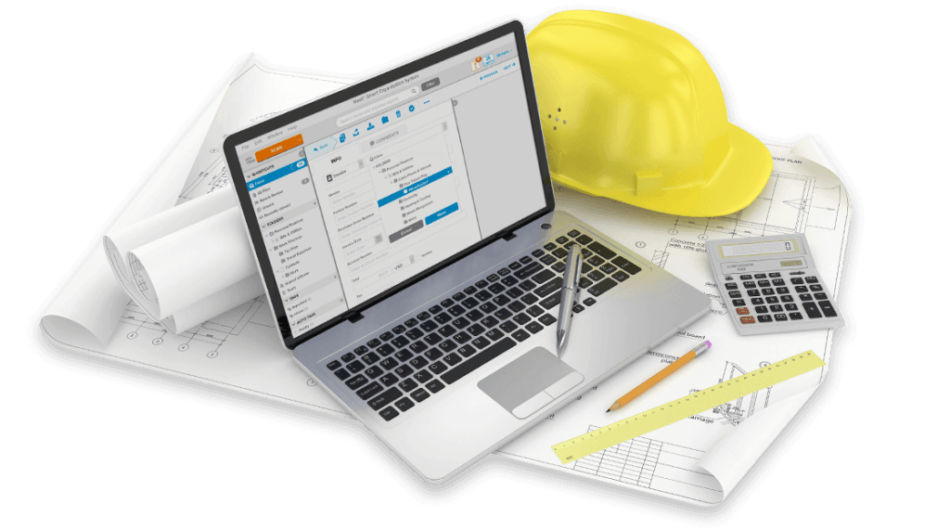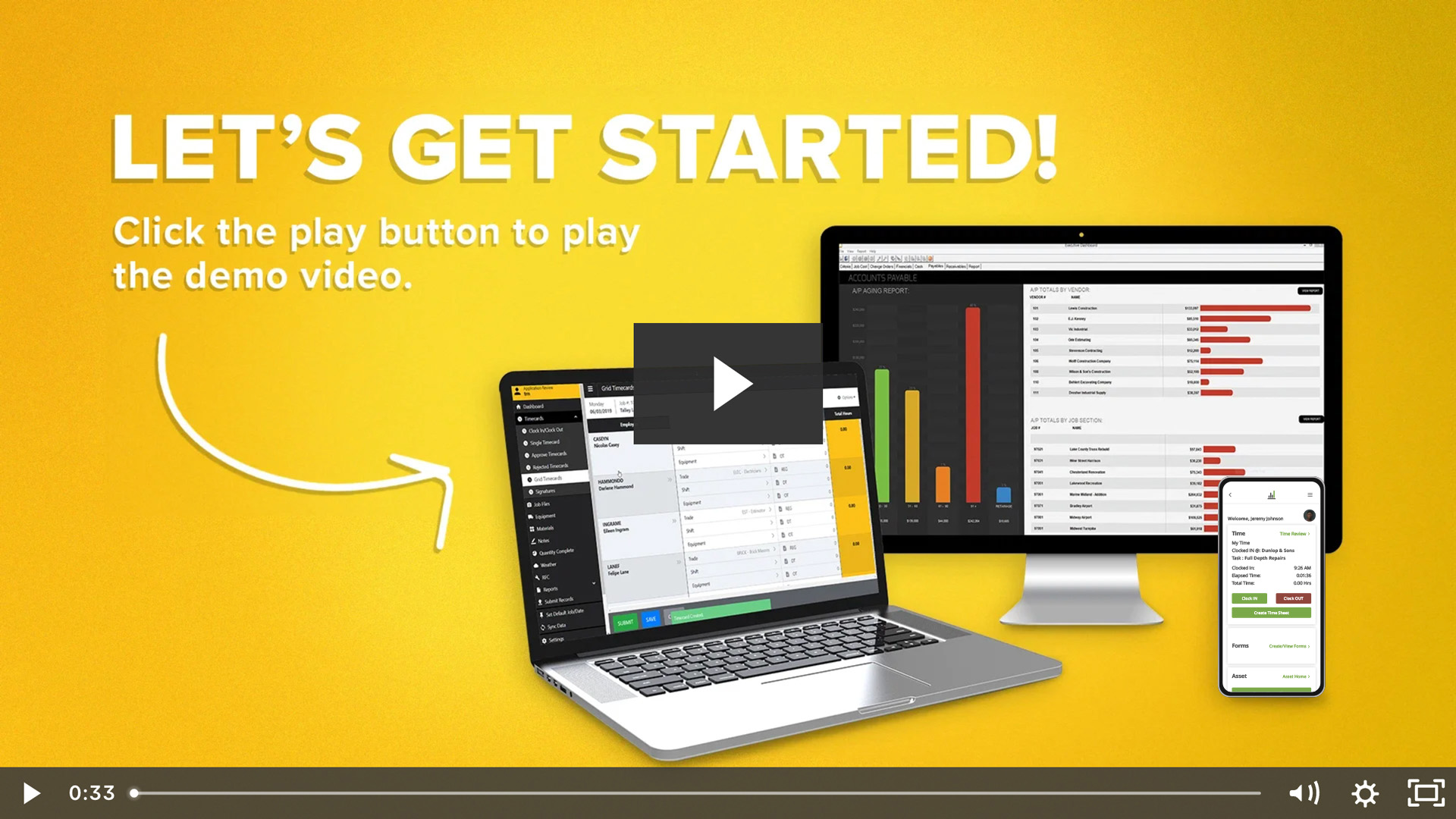
Construction companies work hard to stay ahead of the curve and be profitable. In 2025, the industry faces a rapidly evolving landscape, where staying competitive requires a strong grasp of new trends and regulatory demands. The integration of advanced technologies like AI, heightened cybersecurity and a focus on Environmental, Social and Governance (ESG) standards are reshaping the way contractors approach compliance and cost management.

Using accounting software for construction can help enhance your business’s management capabilities. With real-time visibility into project financials, precise cost tracking and predictive forecasting powered by artificial intelligence, construction accounting software positions you for success at every stage of the project. In this article, we will explore some best practices that can help make jobs more profitable and detail how accounting software can streamline these processes.
Monitoring Project Performance with Construction Accounting Software
Evaluating a project’s performance allows companies to gain valuable information about areas of success and areas needing improvements, which can guide decision-making and strategy development.
Additionally, data collection helps establish benchmarks for contractors who can use them as comparison pieces throughout future projects.
Accounting software for construction can help contractors evaluate project performance using several key indicators, including:
- Labor Utilization Rates: Labor utilization rates, also known as labor productivity rates, are metrics used to measure the efficiency and effectiveness of labor resources in a construction project.
- Equipment Utilization Rates: Equipment utilization rates measure how effectively construction equipment is utilized on a project. It is a metric that quantifies the time equipment is actively used for productive work in relation to the total available or planned equipment hours.
- Margin Percentage Achieved: Shows profit margins realized after subtracting raw costs like materials, subcontractors, rentals and crew wages from total revenue earned.
- Direct Labor Hour Variance: Difference in estimated vs. actual labor hours required on a specific task and its effect on projected completion dates. It is used as a point of reference when adjusting schedules.
- Indirect Labor Hour Variance: Similar to direct variance but affects general tasks not tied to an individual tradesperson or machine operator.
- Overhead Variances: This data refers to the differences between the expected or planned overhead costs in a construction project and the actual overhead costs incurred during the project.
- Billing and Progress Billing: Billing refers to the invoicing process where contractors submit payment requests to clients for work completed, including labor, materials and equipment costs. Progress billing is a specific type of billing method used in construction, where invoices are issued based on the completion percentage of specific project milestones or the project’s overall progress.
In 2025, accounting software also provides predictive analysis, using AI to identify potential issues before they occur, giving contractors an edge in proactive project management.
Construction companies can harness these tools to detect patterns in cost overruns, adjust budgets and maintain control over profit margins more effectively.
Overall, construction accounting software help contractors effectively monitor project performance by providing accurate and up-to-date financial data. This allows for real-time decision-making to encourage profit and mitigate losses.
Monitoring Construction Costs: The Role of Accounting Software in Effective Cost Management
Construction accounting software provides a centralized and automated platform for tracking project expenses, analyzing financial data and streamlining billing processes. It allows for real-time visibility into job costing, enabling proactive decision-making and timely identification of cost overruns.
With detailed cost reports and budget-to-actual comparisons, robust software facilitates effective cost-control measures and supports accurate forecasting. Additionally, automated billing features ensure efficient invoicing, reducing delays in payment collection and improving cash flow management.
In today’s regulatory environment, automated compliance tracking has become essential. Accounting software can monitor and alert contractors to new financial and tax regulations, reducing the time and risk associated with manual compliance checks.
Here are a few additional examples of how accounting software monitors construction costs by tracking expenses:
- Conducting a Cash Flow Analysis: A cash flow analysis involves utilizing accounting software to track, record and analyze the inflow and outflow of cash within a construction project.
- Risk Management: Construction risk management identifies, analyzes and mitigates potential financial, legal, regulatory and operational risks impacting a construction project.
- Audit Preparation: Accounting software for construction can prepare a contractor for an audit by providing a comprehensive and organized record of all financial transactions related to a construction project. It can also automatically generate reports and financial statements that can help auditors quickly and easily review the contractor’s financial records, therefore determining if there was any incorrect spending.
Job costing is another critical piece of cost management because it allows contractors and project managers to track a project’s overall cost by recording all expenses related to that particular job. Costs include materials, labor and overhead. Knowing where every dollar goes is essential for budgeting, forecasting and monitoring the project’s profitability.
Construction accounting software plays a crucial role in job costing by providing accurate and detailed financial tracking and analysis for projects. The software typically includes features such as:
- Cost tracking: Precise tracking of project expenses, including materials, labor and overhead costs. It helps record and allocate costs to specific codes within a job.
- Budgeting and estimating: Create budgets and estimates for construction projects based on historical data, industry standards and specific project requirements. Also, compare actual costs against estimated costs, highlight deviations and enable proactive measures to control expenses.
- Time and labor management: Track employee time and attendance, labor costs and productivity. Easily assign labor to specific projects and accurately calculate labor costs for each job.
- Reporting and analysis: Generate comprehensive reports, including cost variances, profitability and project performance to determine the financial health of projects.
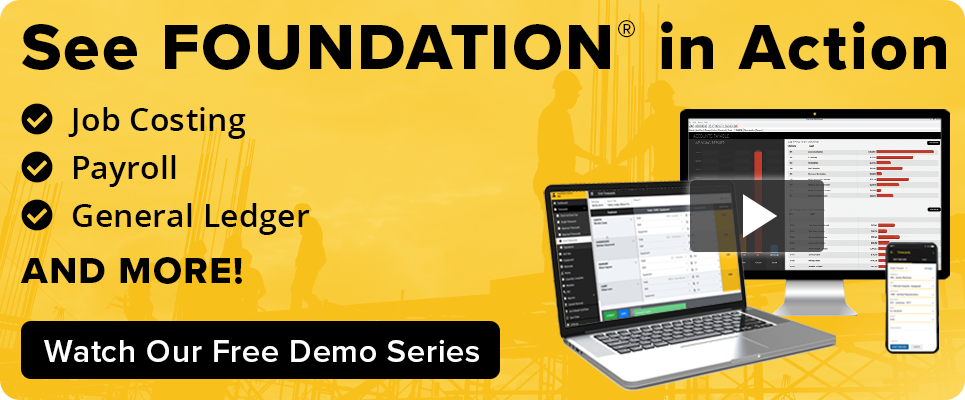
Implementing These Best Practices Paves the Way for Success.
In today’s competitive industry, the utilization of accounting software has proven to be a crucial best practice for achieving success. Effectively managing finances and resources plays a pivotal role in completing projects on time while also meeting profit margins.
As ESG (Environmental, Social and Governance) standards gain importance, contractors now face added pressure to track sustainability metrics. Accounting software can help by centralizing these data points, ensuring compliance with ESG criteria and assisting with regulatory reporting requirements in 2025’s landscape.
FOUNDATION® accounting software for construction offers a comprehensive solution that empowers companies to track their finances and manage their bottom line efficiently. Contractors can effortlessly monitor costs, labor, time and inventory levels by using various cost-tracking tools included in the system.
Experience the future of construction accounting today—contact Foundation Software to learn more about America’s #1 construction accounting software or schedule a personal demo to see how we can improve your business’s productivity in 2025 and beyond.
Share Article
Keep on current news in the construction industry. Subscribe to free eNews!
Our Top 3 YouTube Videos
Learn about our software more in depth with product overviews, demos, and much more!
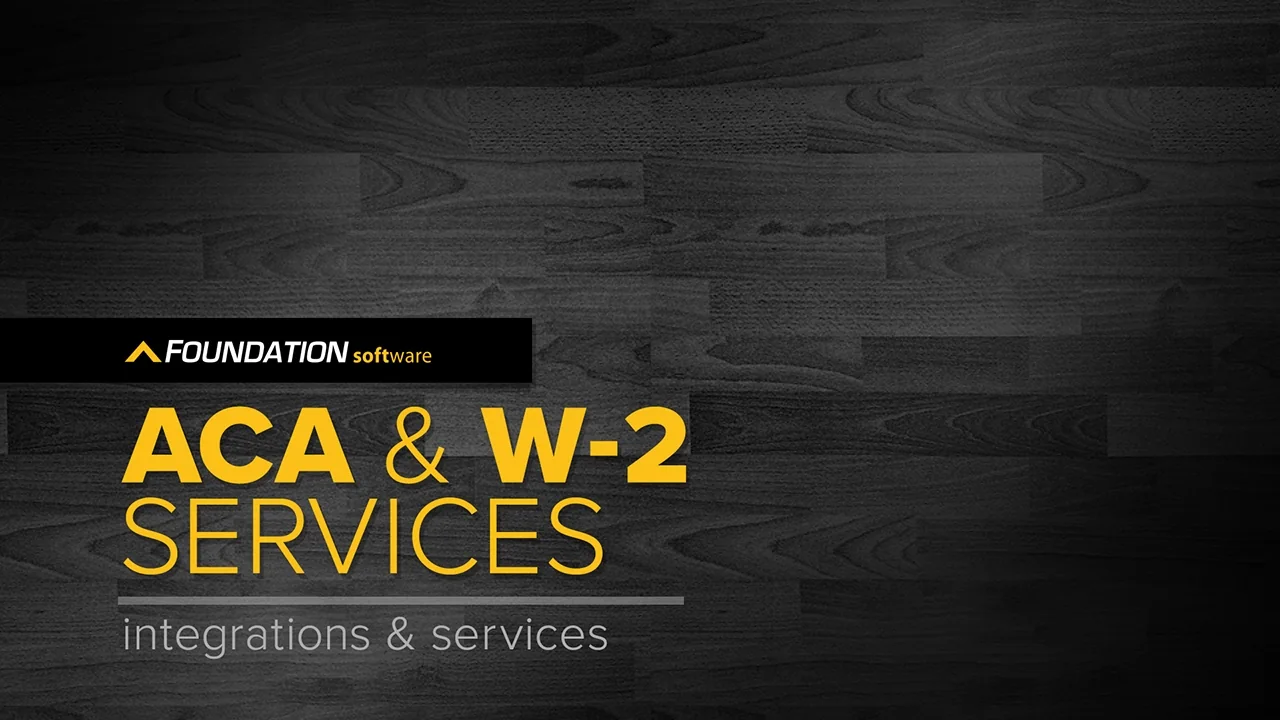
Our ACA reporting & e-filing services include official 1094-C and 1095-C IRS reporting, optional e-filing (no applying for a TCC code required), mailing to your employees and experienced support to help you.
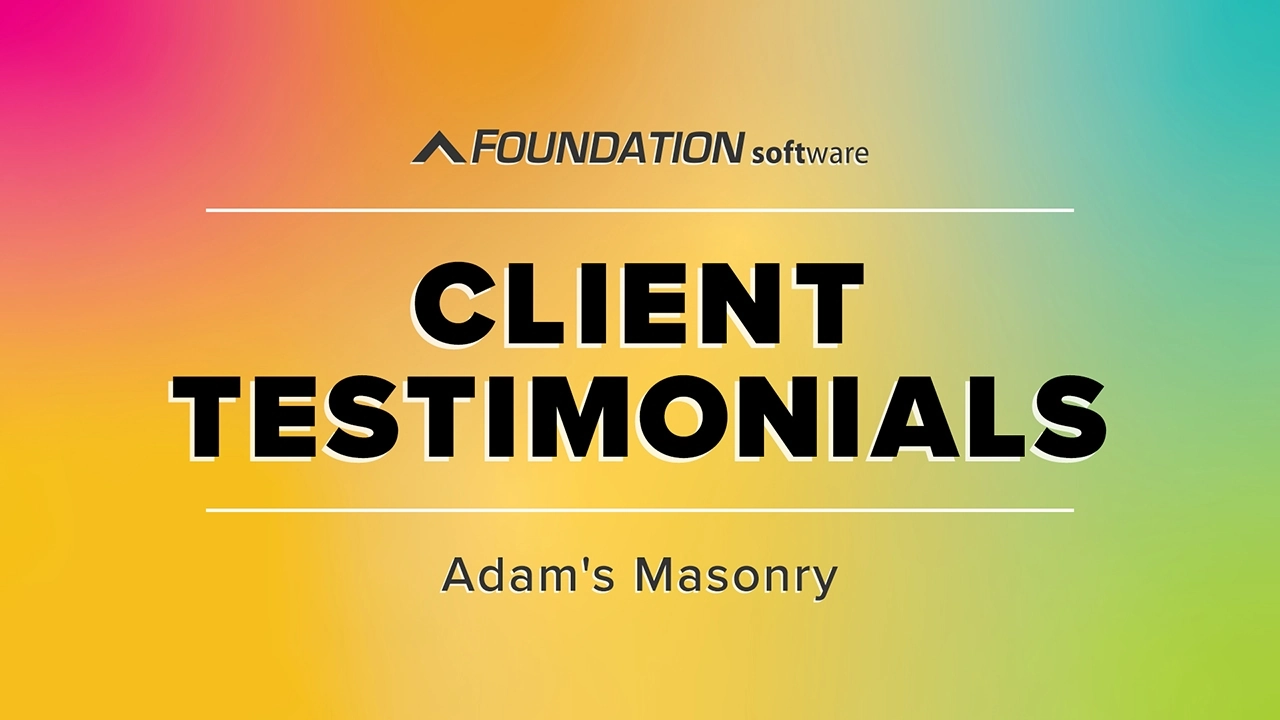
There are plenty of reasons to make FOUNDATION your choice for job cost accounting and construction management software — just ask our clients!
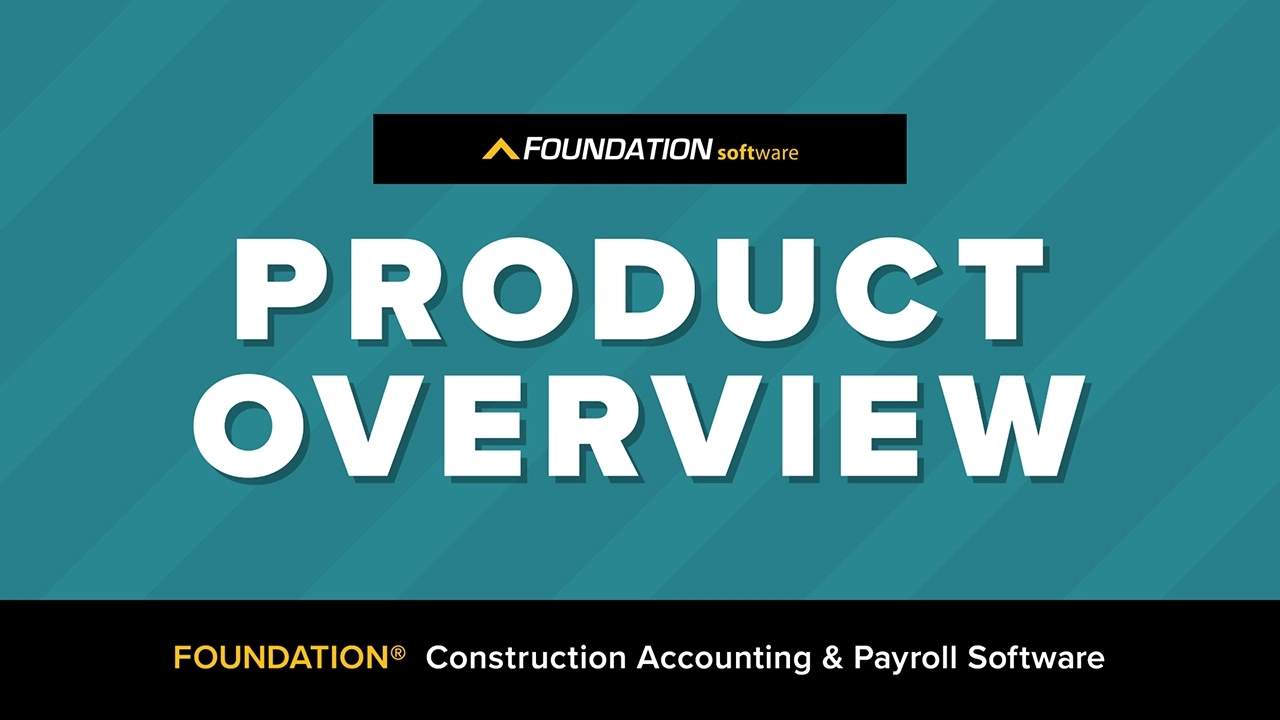
From job cost accounting software, to construction-specific payroll. Get an overview on your next all-in-one back-office solution.

